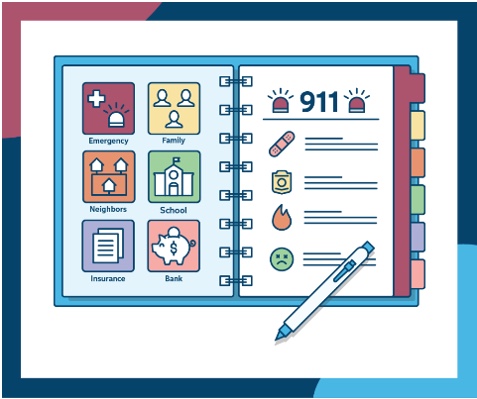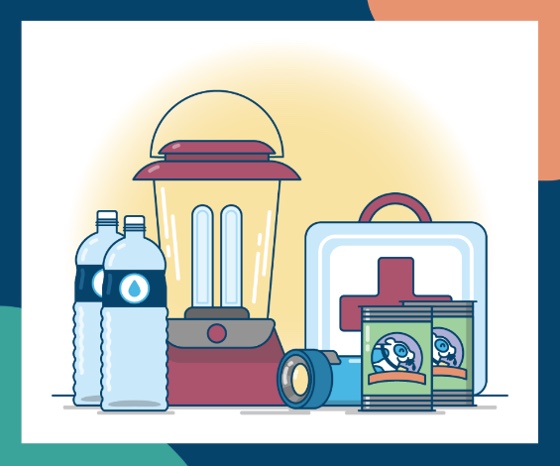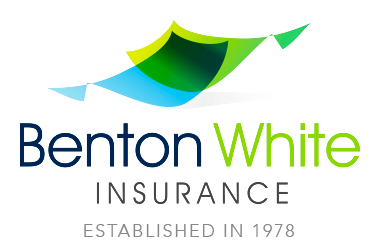(You Probably Haven’t Heard Before)
You hear them outside, groaning and murmuring about “brains.”
You never thought this day would come.
But here you are, trapped in your house, unprepared for the zombie apocalypse.
You reach for your last cracker, a sad attempt at a meal.
No, this blog isn’t about zombies, but it could be.
Why?
Preparing for storm season is similar to preparing for the fabled zombie apocalypse. So, why not take the extra motivation to prepare for both?
We talked with our claims team about how to prepare for storm season and they gave us seven tips you probably haven’t heard before.
1. Photograph or video the interior and exterior of your house.
This documents the type and condition of your interior and exterior materials, as well as the personal property in your house. This is a relatively quick way to inventory your valuables and contents.
Use this time to also complete any maintenance tasks. While maintenance is typically not covered under your policy, it can lead to larger issues later.
2. Make sure your homeowners insurance policy is up to date.
Tell your agent about any major improvements or changes to your house. Your insurance policy can’t cover something that your insurance company doesn’t know exists.
Some of the home improvement projects to discuss with your agent include:
- Remodeling
- Renovating
- Adding square footage
- Adding a deck
- Installing a pool
- Finishing your basement
- Building a new structure (pole barn, shed, garage, etc.)
- Replacing your roof, siding, windows or similar exterior features
- Anything that adds significant value to your house
This is also a good time to consider adding more coverages to your policy, such as: Inland Flood coverage, Undamaged Siding and Roofing endorsement. If you are at a higher flood risk, you may also want to consider flood insurance before storm season. Contact your agent to discuss what additional coverages or policies may be right for you.

3. Make physical copies of important contact information.
We are accustomed to having phone numbers saved in our cellphone, but when the power is out you may find yourself needing to know important phone numbers without your saved contacts. Print contact information for people or organizations you may need to contact from a different phone and store it in a waterproof container. Some contacts to include on your list may be:
- Local emergency services
- Schools and childcare your kids attend
- Neighbors
- Insurance agency or company
- Financial institutions
In addition to your insurance agent’s contact information, it’s a good idea to have a copy of your homeowners insurance policy available. If you have online access to your policy, make sure you remember your login credentials. Auto-Owners policyholders can access their policy 24/7 by signing in to our website.
4. Assemble a comprehensive emergency kit and store it in a cool, dry place.
You know you need non-perishable (canned or boxed) food and bottled water on hand in case of emergency. But a comprehensive emergency kit is more than food. And it shouldn’t be stored in a cardboard box. Keep your supplies in an airtight container to keep water and curious critters out.

According to Ready.gov, your emergency kit should have enough supplies to last your family several days and include:
- Canned meats, fruits and vegetables
- Protein or fruit bars
- Dry cereal or granola
- Peanut butter
- Dried fruit
- Canned juices
- Non-perishable pasteurized milk
- Manual can opener (for food)
- Battery-powered or hand-crank NOAA weather radio
- First-aid kit
- Whistle (to signal for help)
- Batteries
- Flashlights
- Power banks for your devices (like your phone)
- Plastic tarps and duct tape to create a shelter or temporarily repair leaks
- Blankets, pillows, sleeping bags
- Basic over the counter medicines
- Hand sanitizer
- Disinfecting wipes
- Toothbrushes and toothpaste
- Moist towelettes, garbage bags and plastic ties (for personal sanitation)
- Feminine supplies and personal hygiene items
- Toilet paper
- Cash or traveler’s checks
- Wrench or pliers (to turn off utilities)
- Local maps
- Pet food
- Pet bed or crates
- Matches in a waterproof container
- Fire extinguisher
- Mess kits, paper cups, plates, paper towels and plastic utensils
- Paper and pencil
- Books, games, puzzles or other activities for children
A camp stove or other means of cooking without power is a great idea, but never use equipment designed for outdoors in an enclosed area. This poses a huge fire risk, as well as carbon monoxide poisoning.
5. Consider purchasing plywood, nails, straps etc. before a storm is on the way.
Depending on your location, such as coastal areas, having some items stored away to secure your home can be helpful.Prices for these items can go up and materials can be scarce with a storm on the way. Stocking up on some of these now may save you time and money later.
6. In case of an evacuation, consider preparing a bag of basic essentials for each family member.
Include basic clothing and hygiene products, as well as device charging cables, headphones and battery packs to last you a few days. Also consider bringing a small battery-powered radio in case cell service is lost. Don’t forget pet essentials! Keep these go bags handy if evacuation is a possibility.
7. Practice your family’s emergency plan!
Your emergency plan is only as good as your family’s understanding of it! You have storm and fire drills at school and work, why not home too? Take some time to rehearse how your family will use your emergency plan and ensure everybody knows where the plan is kept, along with all your emergency supplies.
If you don’t already have a documented emergency plan, Ready.gov provides templates to document your family’s emergency plan. They recommend your emergency plan address these questions:
- How will we receive emergency alerts and warnings?
- Where will we take shelter?
- What is our evacuation route?
- What is my family/household communication plan?
- Is our emergency preparedness kit up to date?
We hope these tips help you prepare for this storm season. And it might just prepare you for zombies someday too.
We’re here to help – prepare and insure is what we are all about. You can easily reach us at info@BentonWhite.net or TEXT or CALL us at 615.377.1212. We believe in earning your business. Let us earn yours!
Copyright Auto-Owners Insurance Company © 2022. All Rights Reserved.





